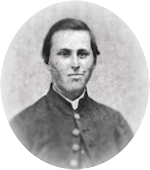19th. Wednesday. Firing again on picket. Turned out. At daylight heavy firing commenced on left with infantry. At 8 A. M. learned the infantry had fallen back in confusion, losing 24 pieces of artillery. 8th and 19th corps broken. 6th corps firm and in line. Cavalry went into position immediately and gave infantry time to form. Crossed the pike and formed again–under heavy fire all the time. Kept the position until Sheridan came up, then sent over to the right again. Charged rebel cavalry. Little before dusk whole line advanced–routing the rebs. Two regts. of 3rd Div. charged to the right, driving reb cavalry over Cedar Creek and the rest charging on right of 19th corps, 5th N. Y. in advance. Overtook the artillery and wagon trains, capturing it and many prisoners.[1]
[1] Note–The modest entry under date of Oct. 19, 1864, refers to the historic battle of Cedar Creek, Va., when Sheridan made his famous ride on his black horse from Winchester, “twenty miles away,” and saved the day. During Sheridan’s temporary absence from his army, Gen. H. G. Wright, the next in command, permitted himself and the army to be totally surprised at three o’clock in the morning, by the recently defeated army of Gen. Jubal A. Early. The Union troops were nearly all sleeping in their tents when the enemy’s cannon and musketry opened on them in a terrific onslaught at close range. The Union artillery was mainly captured, nearly 5,000 Union soldiers killed and captured, and our army, except the Cavalry and one Division of Infantry, started in panic and confused retreat towards Winchester in the rear–where Sheridan had spent the previous night. Up to that point the event had been one of the greatest Union disasters of the war. But about 10 o’clock in the morning Sheridan arrived on the field in the dramatic manner described in the poem, “Sheridan’s Ride,” and instantly all was reversed. Meanwhile the Cavalry, which had not been involved in the surprise and panic and slaughter, being encamped on the right and left flanks of the army out of the line of the attack of Early, had promptly been ordered to the center and front, where they held the Confederates back from further pursuit until Sheridan’s arrival. Sheridan’s presence promptly restored confidence. The retreating and disorganized troops quickly rallied, and by 3 P. M. a general charge was ordered all along the line occupying some four miles front. The Cavalry charge on this occasion was the finest performance and spectacle at any time witnessed by the writer during the war. The astonished and recently victorious Confederates broke in confusion, their retreat was a worse panic than that of the Union army in the early morning. All our artillery was retaken from the enemy and some thirty cannon captured in addition, besides great numbers of prisoners and the entire wagon train of Early. Early’s army never made another serious rally.–A. B. N.






